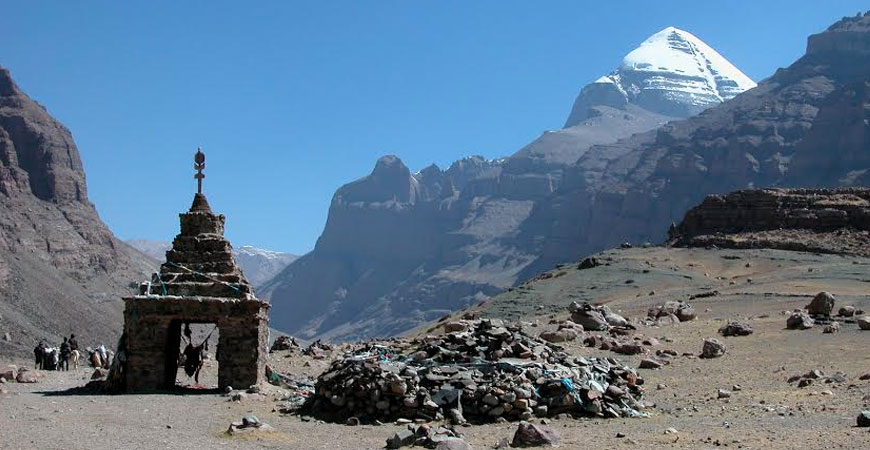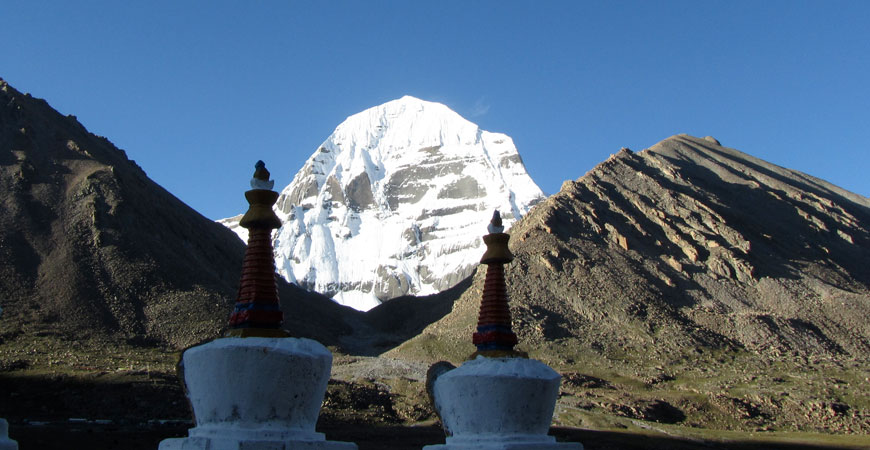Kailash Everest Base Camp Tour
N/A
Per Person
Overview
Kailash Everest Base Camp Tour has been designed for those people who are searching for demanding experience. Kailash Everest Base Camp Tour is all about reaching at the foot of Mount Everest which is the world’s highest mountain and going around Mount Kailash. Kailash Everest Base Camp Tour is a combination of simple pilgrimage tour to culture and adventure tour that gives satisfaction to both Hindus and Buddhist. Not only Hindus and Buddhist, but for all of the people in this whole world who loves adventure.
Kailash Everest Base Camp Tour lets you witness clear views to the North face of Mount Everest and takes you through the massive plains of Western Tibet for a pilgrimage to Holy Lake Manasarovar and Mount Kailash. The striking view of the snow-capped mountains makes this trek an extravagant and a memorable one. After the visit to lakes and its surrounding area, we will be following three days Pilgrimage track around the Holy Mountains to finish what they call, Kora or Parikrama. We will be driving back to Kathmandu after that.
The duration of this cultural, natural and pilgrimage tour is 16 days and the most suitable season to this Kailash Everest Base Camp Tour is April to September. You will also be accommodated at different Hotels and Houses or even Lodges so please visit these places and make your holiday the most beautiful one with Visit Nepal-Tibet Treks!
Note:This Tour can be customized as per the clients timetable and Interest!
Included/Exclude
- Tibetan English speaking tour guide
- Accommodations as specified as above
- Private vehicle for all transfer per the itinerary in Tibet
- Private driver
- All necessary Travel permit
- Entrance tickets for all the sights per the itinerary
- Petrol for the tour vehicle
- Everest Region protection fee
- Car entry fee for Everest. B.C region
- Lunch & dinner, drinks, snacks (You can easily explore on your own, 1-10 US$ per meal)
- Tibet group visa, USD190 for US citizen, USD90 for other nationalities
- Nepal visa, $30 for a 15 days multiple entry tourist visa
- Personal Natural expense like Laundry, IDD calls, etc
- Bank Telex wire transfer processing fee
- Tips for your guide and driver
- Porter at Border if used
- Tipping and all not mentioned above
- Airfare KTM/LXA inclusive of Airport Tax
Trip Itinerary
Day 1: Arrive Lhasa (3680m.)
Arrive Lhasa by train from China side or fly from Kathmandu. Warm welcome by our Tibetan Guide, either at train station or Airport as per your suitable destination. Transfer to the Lhasa city at your Tibetan style Hotel. Check in to the Hotel then free afternoon for acclimatization. O/n Hotel.
Day 2: Lhasa sightseeing
On this second day morning you will take an easy visit to Jokhang Temple. This temple is the most revered shrine in all of Tibet and is constantly bustling with devout worshippers. You will also be given the opportunity to shop in Bharkhor, the crowded central market of Lhasa. In the afternoon you will visit is Sera Monastery, a fifteenth century sprawl of golden roofs and whitewashed walls. This well preserved monastery is located just a few miles North of Lhasa and is home to several hundred monks. Its famous debating activities are happening 3-4pm quite regularly every day, so remind your guide not to miss it.
Day 3: Lhasa sightseeing
A trip to Tibet would not be complete without experiencing the vital Potala Palace. This palace is Lhasa's cardinal landmark and is a wonder of Eastern architecture. Your first site of this massive structure will be a magical moment remembered for years to come. It has been a palace since the fifth or sixth century and was once home to the Dalai Lama. This truly amazing day will ended with a visit to the Drepung Monastery. Once the world's largest monastery, housing 10,000 monks, Drepung monastery lies hidden in rocky ridges just beyond the city. Surprisingly much of the building was left untouched throughout so many hundred of years.
Day 4: Lhasa / Yamdrok Lake / Gyantse / Shigatse (360KM, 7-8hours, 3900M high)
Morning drive up to Kambala pass (4794m), you will have a glimpse of Yamdrok-tso there, which is one of the three holy lakes in Tibet. Then along the Friendship southern Hwy to Gyantse, visit the famous stupa - Gyantse Kumpum, the most stunning architectural wonder in Tibet. Late afternoon drive to Shigatse, overnight at Shigatse.
Day 5: Shigatse / Sakya / Lhatse ( 200KM, 6 hour drive, 4050M high)
Morning visit Tashilunpo Monastery and the spectacular tombs of Panchen Lamas, do its kora. Then start driving to Sakya, visit Sakya Monastery, which is the main monastery at Sakyapa, hike around the monastery northern ruins. Late afternoon drive to Lhatse. Overnight at Lhatse,
Day 6: Lhatse / Saga (306KM, 5-6 hours, 4600M high)
Today drive from Lhatse to Saga, pass several high plateau lakes, towns, herders tents and along the route with plateau mountain ranges. Overnight at Saga Hotel. (Twin-room with private bath).
Day 7: Saga to Manasarovar ( 500Km, 8 hours, 4560m high)
Taking another 255km drive from Saga to Paryang, you weave your way through small dusty town of Zhongba amidst enchanting panoramic views. Overnight at Paryang (Guest house).
Day 8: Manasarovar to Darchen (310km, 4hours, 4560m high)
Morning drive pass the many villages and camps of Yak herders with the distance view of snow capped mountains, cross the Mayun-la pass (5216m), if lucky might see many wild animals at the plateau grasslands. After arrival at Lake side, make a walk to Chiu Monastery which is the best point to see Lake Manasarovar. Manasarovara is the lake of compassion, tranquility and bliss. After completing the memorable morning Bath and Puja you will be heading towards Darchen, prepare for trekking. Overnight at Darchen (Guest house).
Day 9: Trek from Darchen to Dira-puk Monastery, 20km, takes about 5 - 6hours (Camping)
The first day's parikarama is a gradual walk with multitudes of other local pilgrims chanting and praying. The trail leads to few ups and downs till you reach your camp at Dirapuk (4,750 m.). Camping on the nice grassy meadows with a view of Kailash, North West face at Dirapuk for overnight halt.
Day 10: Trek from Dira-puk Monastery to Zutul-puk Monastery by crossing Drolma-la Pass, 15KM, takes about 6 - 7hours (Camping)
Today your parikarama leads to much higher side of the holy path just beneath the Mount Kailash. The walk will bring you to one of the highest point at Dorlma La, 5,200 m. before descending to the gradual field towards Zuthulphuk for the overnight camp. Zuthulphuk has a small monastery.
Day 11: Trek back to Darchen, 14Km, 4- 5hours
The winding gradual tracks finally ends your holy pilgrimage (5hours hours trek), Overnight at Darchen (Guest house).
Day 12: Darchen Saga (520KM, 9hours, 4600M high)
Today start drive back to Saga, you will have a last view of the Mt.Kailash on the way. Overnight at Saga ( twin room with private bath).
Day 13: Saga to Old Tingri ( 200km, 5-6 hours, 4390M high)
Today drive to Old Tingri via Peiku-tso Lake ( Where you can see the Mountain Shishapangma). Overnight at Old Tingri (Guest house)
Day 14: Old Tingri / Rongbuk / Everest Base Camp - Rongbuk (100KM, 3-4hours, 4980-5200M high)
Morning drive to Rongbuk along the Everest base camp trek rough road. Rongbuk is the highest monastery in Tibet, still a good point to see Mt.Everest. Afternoon trek from Rongphu to E.B.C, it takes about 2 hours. Or you can take animal carriage ( 30rmb/per person, round-trip). Overnight at Rongbuk guest house.
Day 15: Rongbuk - Zhangmu
Drive Rongbuk to Zhangmu. O/n Hotel.
Day 16: Zhangmu - Kathmandu(1300m)
Today is the last day in Tibet for this excited Mt. Kailash and Everest Base Camp tour. After Breakfast drive Zhangmu to Kodari Tibet - Nepal border. Your Tibetan guide and driver will say good bye to you then meet with our Nepali guide he will assist you for immigration formalities then continue 5 hrs drives to Kathmandu. O/n Hotel. [1300m] 123km.
Day 17: Departure
This day you will be transferred to Airport for final departure or you can still do some tour or Trekking in Nepal, this can be discuss before or after your amazing Mt. Kailash Mansarovar and Everest Base Camp tour in Tibet.
Note: This itinerary can be customized as per situation.



